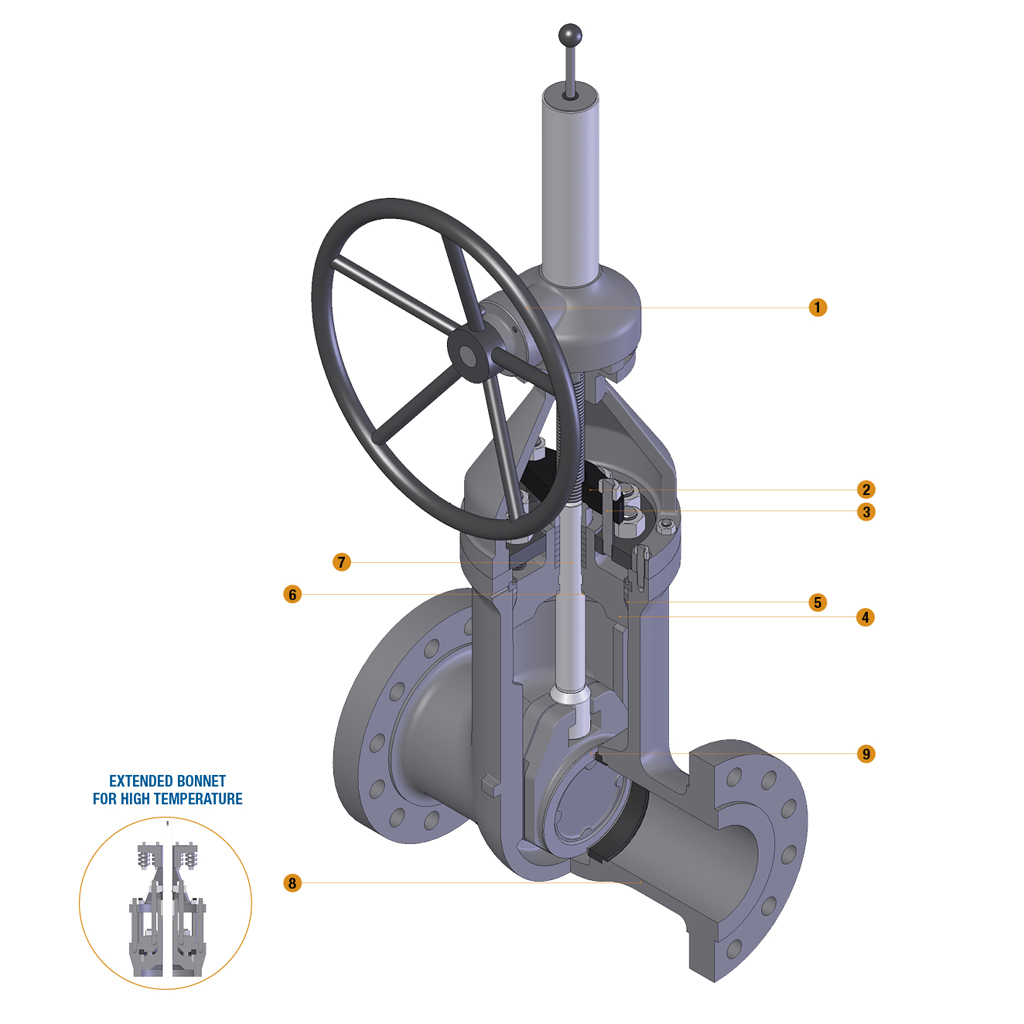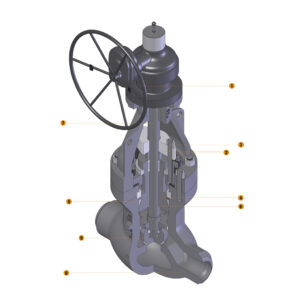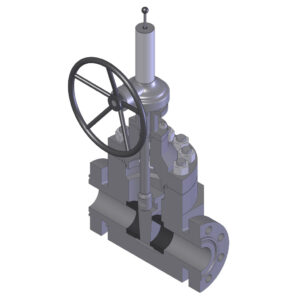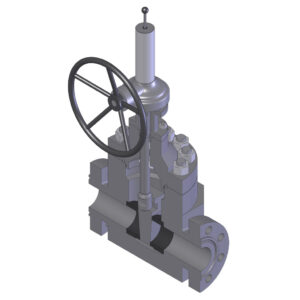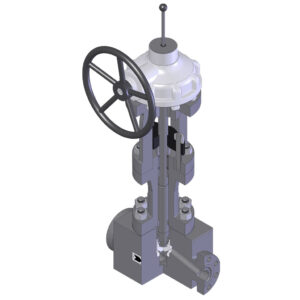Pressure Seal Bonnet Gate Valves
ASME B16.34/API 600
CAST OR CARBON ALLOY STEEL, OUTSIDE SCREW AND YOKE, RISING STEM, NON-RISING HANDWHEEL, WELDED-IN SEAT RINGS, REMOVABLE YOKE SLEEVE, GLAND REPACKING UNDER PRESSURE.
INSTALLATION REMARKS:
Pressure seal valves are best fit for vertical stem / horizontal flow installation. Special cases can be evaluated and developed on request.
Description
OPERATOR
The spoked handwheel is fabricated from steel pipe. The hub is coupled to the yoke sleeve by means of a key. Larger valves are equipped with a bevel or spur gear gearbox unit.
GLAND AND FLANGE
They are in forged steel and are supplied in two pieces, self aligning design to allow the gland to slide parallel to the stem even if the eyebolts are unevenly tightened.
GLAND BOLTS AND NUTS
The forged steel gland bolts are of the eyebolt type which can be swung outward for ease of gland repacking. They are fixed to the bonnet by hinge pins.
BONNET
It is machined in the same grade of the body or in superior alloys, if required. The pressure seal design keeps it tight to the body at high pressures even if bolts are loose or material dilatation occurs. It can be cast or machined from bar. It incorporates a stuffing box sized in accordance with the API standard, and in case can be extended for very high temperature applications. A locking flange with a set of bolts pulls the bonnet outward, against the gasket, giving a preload for initial sealing between body and bonnet.
PRESSURE SEAL RING
It is machined in the same grade of the body or in superior alloys, if required. The pressure seal design keeps it tight to the body at high pressures even if bolts are loose or material dilatation occurs. It can be cast or machined from bar. It incorporates a stuffing box sized in accordance with the API standard, and in case can be extended for very high temperature applications. A locking flange with a set of bolts pulls the bonnet outward, against the gasket, giving a preload for initial sealing between body and bonnet.
BACKSEAT
It is integral with the bonnet and hardfaced and will provide a perfect tight seal between stem and bonnet, which will allow emergency repacking operation even under pressure.
STEM
The stem is part of the trim and is available in a wide range of materials in accordance to API 600 or customer’s requirements. The stem is provided with a T-shaped head. A ground backseat is provided to ensure a perfectly tight seal to the stuffing box when the valve is fully open. The stem is highly finished in order to minimize friction and prevent damage to the packing. The thread is trapezoidal ACME type. All the stem sizes comply with the API 600 standard.
BODY
The body is in carbon or stainless steel and is available in many other CRA. It is carefully designed for total reliability, low pressure drop and simple maintenance. The basic dimension, i.e. wall thickness, face to face and flanges comply with the relevant API and ASME standards. Wall thickness and design can be both B16.34 or API600. The body neck is cylindrical in order to host the pressure seal bonnet. The body is basically supplied with renewable welded-in seats. Bosses are provided for drain taps or by-pass piping. The internal surfaces in contact with the fluid can be fully lined or cladded for improved corrosion or erosion resistance.
WEDGE
The wedge is the main part of the trim. It is forged steel, alloy or cast. It is normally supplied as flexible wedge type for improved seating and unseating capability. It is connected to the stem by means of a T-shaped joint. The guides on each side of the wedge are machined. Special care is given to the seating surfaces which are ground and lapped, integral or hardfaced. A cladding or lining can be applied to the wedge to improve its resistance against erosive and corrosive environments. it can be machined with the flexible option.
